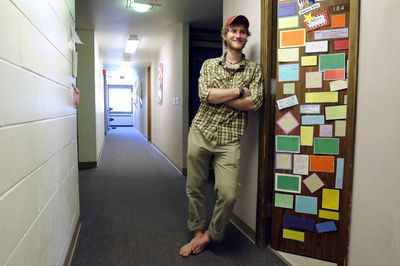More than just hallway monitors
Resident adviser applications are up as students seek help covering college costs

As a resident adviser majoring in psychology at Washington State University, Anna Harrison is well-equipped to deal with the “natural dramas of being at college.”
“The conversations I have with students can be really difficult,” said Harrison, who is assigned to an all-freshman dormitory on WSU’s Pullman campus.
The topics are as varied as dealing with difficult roommates, keeping the hall clean, staying sober, or suicide prevention.
But the job is worth the challenges. Harrison, like most university students who are appointed as dormitory advisers, receives free room and board, including meals.
“I’m paying for school myself, and as a middle-class student I don’t get grants from the government,” Harrison said. “It is definitely a huge help.”
With the economy in the tank and college tuition climbing steadily, more students in the U.S. are applying for jobs as RA’s – aka resident assistants and community advisers. While the job rarely pays much in terms of wages, the free room and board can amount to thousands of dollars.
WSU officials said the application process is over for next year. The number rose slightly, to just more than 300. Officials are already getting inquiries from students asking for information about positions for the 2010-2011 school year – well ahead of schedule.
“We usually see that in the summer,” said Coree Newman Coronado, assistant director for residence life.
Applications at Eastern Washington University didn’t go up a lot – usually about a third to a half of those in current positions return for a second or third year – but applications for summer dormitory assistants are on the rise, said Steve Bertram, manager of residential life operations.
Sometimes students may apply, attracted by the financial benefit, and learn in the process that they are required to do more than enforce the rules and baby-sit the drunk and disorderly. At most colleges, the students are expected to serve as leaders, too.
“It is very convenient money-wise, but you can’t go into wanting just the money,” said 21-year-old Megan McFarland, a community adviser at Streeter Hall on EWU’s Cheney campus. McFarland, who applied to be an assistant for a third year, estimates she has saved $21,000.
“Really, we’re asking them to be the individual that helps students be connected to the hall, and connected to the university and other students,” WSU’s Newman Coronado said.
At Whitworth University, resident assistants organize an activity seven night a week, known as “Prime Time.”
It can be something as silly as “turkey bowling” or fun, like having kittens and puppies in dorm common areas for students to play with. Some programs have an educational focus, like sexual health or alcohol-related discussions. Each resident assistant is asked to organize eight events a month.
“We ask an amazing amount of them in terms of building relationships with people on their floor and developing programs,” said Dick Mandeville, associate dean of students in charge of residence life at Whitworth.
One drawback for students seeking a financial benefit is that sometimes dormitory assistants are discouraged from having other jobs outside of the hall. And most find the positions so time-consuming, they couldn’t hold down another job even if they wanted to.
But as the cost of higher education continues to rise, the financial benefit of being an RA will outpace any minimum-wage job, officials said.
At Whitworth, the number of applications remained steady for next year, Mandeville said. He expects the applications to go up next year in line with tuition increases.
“Frankly I expected to see something like that this year. We are surprised that we didn’t,” Mandeville said.
“A position on campus that pays room and board has always been pretty attractive.”